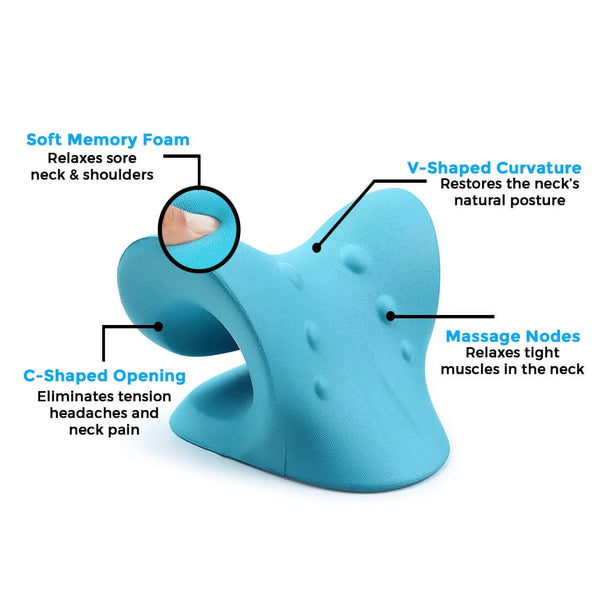Neck Cloud: Ergonomic Style for Optimum Comfort and Discomfort Reduction
Neck Cloud: Ergonomic Style for Optimum Comfort and Discomfort Reduction
Blog Article
The Impact of Stress And Anxiety on Neck Pain: Strategies for Lowering Tension and Pain
In today's fast-paced world, it's no key that tension has actually become a widespread factor in the beginning and worsening of neck pain. The complex partnership in between stress and muscle mass stress frequently leaves people looking for relief from the discomfort that takes place. By exploring targeted techniques intended at reducing tension and advertising leisure, one can begin to attend to the origin causes of neck discomfort and job towards an extra well balanced state of well-being. Join us on a journey to untangle the impact of anxiety on neck discomfort and find reliable ways to minimize pain and enhance overall high quality of life.
Comprehending Stress-Related Neck Discomfort
Neck discomfort is a common grievance that can often be credited to stress and anxiety. Stress-related neck pain can manifest as stress, stiffness, or discomfort in the neck and shoulder area. The connection in between stress and neck pain depends on the body's physical action to stress and anxiety, which can lead to muscular tissue stress and tightness in the neck muscles. Chronic tension can result in consistent neck discomfort and intensify status quo like cervical spondylosis or muscle mass stress.

Identifying Common Stress Locations
Regularly experienced by individuals under stress, tension locations in the body can offer beneficial insights right into the physical indications of mental pressure. One common tension location is the neck, where stress usually manifests physically. Stress headaches, stiff neck muscle mass, and limited variety of movement are usual symptoms of stress-related neck tension. The shoulders are one more usual area where tension collects. Stress and anxiety can cause the muscle mass in the shoulders to tighten up, leading to discomfort and discomfort. In addition, the upper back is susceptible to stress accumulation, particularly in people who experience persistent stress. Poor pose and prolonged resting can exacerbate stress around. The jaw is additionally a typical area for stress-related stress, as many individuals clinch their jaw or grind their teeth when stressed. Understanding these typical tension locations can help people recognize the physical indications of stress and take actions to address them prior to they rise into chronic pain or discomfort.
Applying Leisure Strategies
Relaxation methods are beneficial devices for decreasing neck discomfort created by stress. Furthermore, tasks like yoga exercise and tai chi include both physical movement and relaxation, making them efficient techniques for reducing tension and neck pain. By integrating these leisure strategies into your daily routine, you can assist take care of stress and anxiety levels, reduce tension in the neck, and minimize pain connected with stress-induced neck discomfort.
Including Self-Care Practices
Including self-care practices is important for maintaining general wellness and managing stress-related neck pain efficiently. Participating in routine physical task, such as mild extending workouts or yoga exercise, can assist ease stress in the neck and shoulders. Exercising great position throughout the day and taking regular breaks from extended resting or screen time can likewise avoid strain on the neck muscles.
Additionally, prioritizing adequate rest and developing a article regular sleep routine can contribute significantly to reducing stress degrees and advertising relaxation. Creating a calming going to bed regimen, such as checking out other a book or taking a cozy bath, can help prepare the mind and body for relaxed sleep. Additionally, keeping a well balanced diet plan rich in nutrients and remaining moisturized can support total health and wellness and decrease inflammation that might intensify neck pain.
Including mindfulness methods, such as deep breathing exercises or reflection, can assist manage stress and anxiety and promote leisure. Taking some time for oneself, taking part in leisure activities, and establishing boundaries to protect individual time are likewise important facets of self-care that can contribute to reducing anxiety and minimizing neck discomfort.
Seeking Professional Assistance
How can people efficiently address consistent neck pain that is affecting their daily life and wellness? Looking for expert aid can be a critical action in handling and minimizing neck discomfort. Consulting with health care specialists such as chiropractic practitioners, physical specialists, or orthopedic experts can give important understandings and personalized therapy plans. These specialists can conduct detailed assessments to identify the underlying sources of neck discomfort and recommend suitable treatments.
Chiropractics physician specialize in spinal control methods to enhance positioning and minimize stress in the neck location. Physical specialists supply targeted stretches and workouts to strengthen muscles, improve flexibility, and enhance overall neck function. Orthopedic specialists can offer advanced medical interventions such as shots or medical alternatives for extreme instances of neck discomfort.
Final Thought

Stress-related neck discomfort can manifest as stress, rigidity, or discomfort in the neck and shoulder area. The connection between stress and neck pain click now exists in the body's physical feedback to stress, which can result in muscle stress and rigidity in the neck muscular tissues. Stress migraines, rigid neck muscle mass, and restricted range of motion are usual signs and symptoms of stress-related neck stress. By integrating these relaxation techniques into your day-to-day regimen, you can assist handle tension levels, lower stress in the neck, and ease discomfort associated with stress-induced neck discomfort.

Report this page